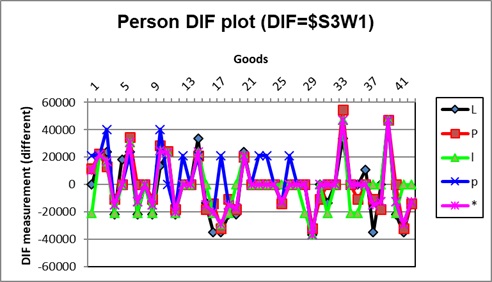Rasch analysis in developing Jambi culture-based ethnomathematics test for prospective mathematics teachers
DOI:
https://doi.org/10.23917/jramathedu.v8i4.2921Keywords:
Rasch Model, ethnomathematics, Validity, reliabilityAbstract
Teachers have an important role in the successful implementation of ethnomathematics in the classroom. Teachers need to have a comprehensive understanding of the context of ethnomathematics. This study aims to develop an instrument for measuring prospective teachers' ethnomathematics knowledge. The instrument was developed in the context of Jambi culture. This research is development research using the Plomp Model, which consists of three stages, namely: 1) preliminary research stage, 2) prototyping stage, and 3) assessment stage. The instrument developed consists of seven indicators and 43 items. Five experts in the fields of cultural studies and mathematics education carried out the instrument validation. The instrument was tested on 74 prospective mathematics teachers. The results show the instrument for measuring ethnomathematics knowledge of prospective mathematics teachers that was developed meets the criteria of unidimensionality, validity & reliability and does not indicate item bias. Therefore, this instrument is appropriate for use in measuring the ethnomathematics knowledge of prospective mathematics teachers in the Jambi cultural context.
References
Andrich, D., & Marais, I. (2019). Rasch measurement theory course. Measuring in education, social and health sciences, 41-53. DOI: https://doi.org/10.1007/978-981-13-7496-8_4
Sumintono, B. (2015). Rasch modeling in educational assessment: An introduction.
Bishop, A. J. (1991). Mathematics enculturation: Cultural perspectives on mathematics education. Kluwer Academic Publishers.
Brandt, A., & Chernoff, E. J. (2015). The importance of ethnomathematics in the mathematics classroom.
Brennan, R.L. (2000). Performance assessment from a generalization theory perspective. Applied Psychological Measurement, 24 (4), 339-353. DOI: https://doi.org/10.1177/01466210022031796
Bond, T. G., & Fox, C. M. (2013). Applying the Rasch model: Fundamental measurements in the human sciences. Psychology Press. DOI: https://doi.org/10.4324/9781410614575
D'Ambrosio, U. (1987). Ethnomathematical reflection. Bulletin of the International Study Group on Ethnomathematics, 3 (1), 3-5.
Falani, I., Akbar, M., & Naga, DS (2020). Accuracy of Estimating Students' Ability in Combination of Item Response Theory Models. International Journal of Instruction, 13 (4), 545-558. DOI: https://doi.org/10.29333/iji.2020.13434a
Falani, I., Iriyadi, D., Ice, YW, Susanti, H., & Nasuition, RA (2022). Rasch Analysis Questionnaire on Perceptions of Covid-19 Stigma among Nurses in Indonesia. Psychological Thought, 15 (1), 12. DOI: https://doi.org/10.37708/psyct.v15i1.530
Kamid, K., Saputri, R., & Hariyadi, B. (2021). Development of high-level thinking skills questions based on Jambi culture. Scholar's Journal: Journal of Mathematics Education, 5 (2), 1793-1806. DOI: https://doi.org/10.31004/cendekia.v5i2.678
Mardapi, D. (2012). Measurement, assessment, and evaluation of education. Yogyakarta: Nuha Medika , 45 .
Lamprianou , I. (2019). Application of Rasch models in social sciences using R. Routledge.
Prahmana, RCI, & Istiandaru, A. (2021). Learning set theory using shadow puppets: Javanese Ethnomathematics Study. Mathematics, 9 (22), 2938. DOI: https://doi.org/10.3390/math9222938
Reise, S. P., & Revicki, D. A. (2014). Handbook of item response theory modeling New York: Taylor & Francis. DOI: https://doi.org/10.4324/9781315736013
Rosa, M., & Orey, D. C. (2007). Cultural assertions and challenges to the pedagogical actions of ethnomathematics programs. For Mathematics Learning, 27(1), 10–16.
Rosa, M., D'Ambrosio, U., Orey, D.C., Shirley, L., Alangui , W.V., Palhares, P., ... & D'Ambrosio, U. (2016). A Glimpse into the History of Ethnomathematics. Current and future perspectives on ethnomathematics as a program, 5-10. DOI: https://doi.org/10.1007/978-3-319-30120-4
Rowlands, S., & Carson, R. (2004). Our Response to Adam, Alangui, and Barton's "Commentary on Rowlands & Carson" Where Does Formal Academic Mathematics Place in a Curriculum Informed by Ethnomathematics? 'A Critical Review'". Mathematics Education Studie, 329-342. DOI: https://doi.org/10.1023/B:EDUC.0000040370.10717.82
Supriadi, S. (2019). Didactic design for learning Sundanese ethnomathematics for elementary school students. International Journal of Learning, Teaching and Education Research, 18 (11), 154-175. DOI: https://doi.org/10.26803/ijlter.18.11.9
Sutrimo, S., Kamid, K., Asrial, A., & Hariyadi, B. (2023). The Potential of Jambi Culture in Mathematics Learning: Jambi Ethnomathematics. Medives Journal: Journal of Mathematics Education at IKIP Veteran Semarang, 7(1), 162-174. DOI: https://doi.org/10.31331/medivesveteran.v7i1.2313
D'Ambrosio's speech. (1990). The Role of Ethnomathematics in Mathematics Education. For Mathematics Learning, 10(1), 39-43.
Powell, A.B., Frankenstein, M., & Andres, P.A. (1997). Ethnomathematics: Challenging Eurocentrism in Mathematics Education. SUNY Press.
Wulandari, S. (2020). Ethnomathematical Analysis of Typical Jambi Food for Social Arithmetic Learning Instruments (Doctoral Dissertation, FKIP).

Downloads
Submitted
Accepted
Published
How to Cite
Issue
Section
License
Copyright (c) 2024 Yelli Ramalisa, Ilham Falani, Feri Tiona Pasaribu

This work is licensed under a Creative Commons Attribution-NonCommercial 4.0 International License.


















